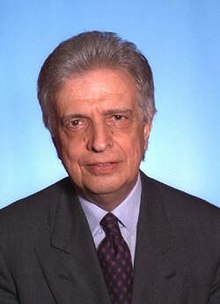Furio Colombo
Furio Colombo | |
|---|---|
 | |
| Member of the Chamber of Deputies | |
| In office 29 April 2008 – 14 March 2013 | |
| Constituency | Piedmont |
| In office 9 May 1996 – 29 May 2001 | |
| Constituency | Turin |
| Member of the Senate of the Republic | |
| In office 28 April 2006 – 28 April 2008 | |
| Constituency | Lombardy |
| Personal details | |
| Born | 1 January 1931 Châtillon, Italy |
| Political party | PDS (1991–1998) DS (1998–2007) PD (2007–2013) NRPTT (since 2015) |
| Alma mater | University of Turin |
| Occupation | Journalist, politician, academic |
Furio Colombo (born 1 January 1931) is an Italian journalist and politician. He is the former editor-in-chief of L'Unità.
Biography
Journalistic and academic career
Colombo was born in Châtillon, Aosta Valley, into a Jewish family. In the mid-1950s, he started working for the Italian national broadcasting corporation RAI, where he collaborated to the creation of cultural radio and television programs, documentaries and journalistic reportages. In the early 1970s, Colombo taught Theory and Techniques of Media and Radio and Television Language in the newly founded Department of Art, Music and Entertainment at the University of Bologna.[1]
In the late 1980s, Colombo moved to New York where he worked as correspondent from the United States for
From 2001 to 2005, Colombo was the editor-in-chief of the left-wing newspaper L'Unità. According to Marco Travaglio, Colombo left the paper after four years due to the opposition of personalities from the Democrats of the Left (DS) party against the excessive autonomy of Colombo from the party lines.[4] From 2006 to 2022, Colombo was a columnist for Il Fatto Quotidiano,[5] which he co-founded. Following the start of the Russian invasion of Ukraine, Colombo said the paper had taken a pro-Russian stance, and resigned from the paper due to its hiring of Alessandro Orsini. He was also critical of the theories of Massimo Fini, a fellow columnist, on the German occupation of Italy during World War II.[6][7]
Political career
Colombo has been elected to the
References
- ^ "Cronologia di Bologna". BibliotecaSalaborsa.it. Retrieved 18 October 2018.
- ^ "Biografia Furio Colombo". Media2000.it. Retrieved 18 October 2018.
- ^ "Storia dell'Istituto Italiano di Cultura di New York". IICNewYork.Esteri.it. Retrieved 18 October 2018.
- ^ "Travaglio: "Non ho capito il motivo del cambio di direttore dell'Unità"". Corriere della Sera. 25 August 2008. Retrieved 18 October 2018.
- ^ "Furio Colombo's Blog". Il Fatto Quotidiano. Retrieved 18 October 2018.
- ^ D'Arcais, Paolo Flores (17 May 2022). "Furio Colombo: "Ecco perché ho lasciato Il Fatto Quotidiano"". MicroMega (in Italian). Retrieved 22 June 2023.
- ^ Furio Colombo (19 May 2022). "Putin il lupo e i porcellini". La Repubblica (in Italian). Archived from the original on 22 June 2022. Retrieved 10 September 2022.
- ^ "Furio Colombo, rinuncia con polemica. Di Pietro: "Temevano un vero concorrente"". La Repubblica. 31 July 2007. Retrieved 18 October 2018.
- ^ "Intervista a Furio Colombo sul compleanno di Marco Pannella". Radio Radicale. 1 May 2015. Retrieved 18 October 2018.
